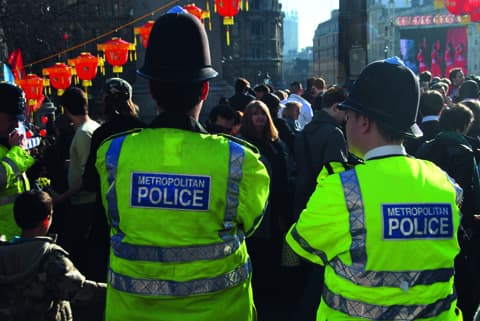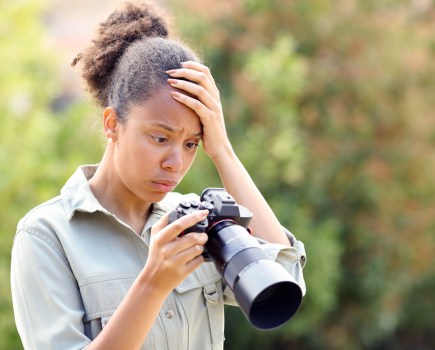See PICTURES AND STORY FROM THE PROTEST HERE
 See PICTURES AND STORY FROM THE PROTEST HERE
See PICTURES AND STORY FROM THE PROTEST HERE
Hundreds of amateur and professional photographers are set to descend on Trafalgar Square tomorrow to defend their right to take pictures in public places.
The ‘mass photo gathering’, starting at noon, is being organised by ‘I’m a Photographer, Not a Terrorist’, a group set up by professional photographers last year, in support of campaigns run by other photographic bodies including Amateur Photographer (AP) magazine and the British Journal of Photography.
The group’s founders include Jeff Moore, chairman of the British Press Photographers’ Association, and photographers Marc Vallée and Jess Hurd, both of whom have fallen victim to anti-terrorism legislation in recent years.
The event – which is not billed as an official ‘protest’ – follows a series of ‘high-profile detentions’ under Section 44 of the Terrorism Act, among them architectural photographer Grant Smith who inadvertently sparked a security alert in the City of London while taking harmless pictures of a church (Smith is helping to co-ordinate the gathering in Trafalgar Square).
The police swoop came just days after BBC photographer Jeff Overs told the Andrew Marr Show how his innocent picture of St Paul’s Cathedral led to him being stopped and quizzed near Tate Modern.
The plight of these photographers and others sparked mass media coverage over the past six weeks after in-depth investigations by several national newspapers.
But the documented experiences of amateur and professionals stretches back much further than that.
For example, in 2005 Amateur Photographer reported how one of its readers, Roy Jhuboo, was stopped and searched by anti-terror police while he was out taking pictures in east London.
Jhuboo was left stunned when two police vans ? containing up to eight officers – were called to Colt Street in Limehouse after he had been spotted taking pictures of a house during a walk from Tower Hill.
Police told Roy that he could have been on a ‘reconnaissance mission’ to launch a ‘rocket’ on nearby Canary Wharf.
Among the long line of amateur victims was John Kelly from Blackpool who said he was left humiliated and feeling like a criminal after police ordered him to delete his pictures.
The drama led to his appearance on BBC Breakfast News in 2008, alongside AP’s news editor who explained that the incident was far from an isolated one.
Last March AP quizzed the counter-terrorism minister in Parliament after more and more similar incidents came to light.
During the meeting – which was brokered by Labour MP Austin Mitchell – the minister said he would prepare guidelines to prevent similar incidents in future.
Despite his assurance there was no let up in police stops as the attitude of police on the ground remained unchanged.
Photographers welcomed, however, a recent ruling by the European Court of Human Rights that police use of Section 44 Stop and Search anti-terrorism powers is unlawful.
The controversial Section 44 law allows police officers to stop and search people without grounds for suspicion.
However, the Home Office plans to appeal the decision and police chiefs have been told that stop and search counter-terrorism tactics remain in force nationwide.
Ahead of tomorrow’s event, which is expected to be peaceful, its organisers released a statement which reads: ‘Our society’s visual history is under threat of extinction by anti-terrorism legislation. Section 44 of the Terrorism Act has, in effect, ended the confidence of the citizen to engage in the act of photography in a public place as photographers, artists and illustrators – amateur and professional – are harassed by police invoking terrorism legislation to stop and search them.
‘The act of documenting our street scenes and public life, our built environment, whether iconic or not, is now considered to be an act of hostile reconnaissance and could result in the detention of the image maker.’
Amateur Photographer‘s news editor Chris Cheesman, who has reported on the controversy and the magazine’s subsequent ‘Rights Watch’ campaign will be among those attending tomorrow’s event alongside AP readers.
AP readers planning to attend can download an ‘AP Rights Watch’ logo’ here.
RELATED ARTICLES
365 photographers sign Sunday Telegraph plea letter
PHOTO CLIMATE ECHOES WARTIME BRITAIN?
Amateur arrested after taking pics in London suburb
AP meets counter-terrorism minister in Parliament
Photographer to complain against City police
Police crackdown on City photographers
Watch a recent More4 News report HERE
Watch a recent London Tonight report HERE
ITN film crew stopped while covering photo story
Terror swoop photographer lodges complaint against police
Photography in public campaign: Video by AP news editor
MP lodges new Commons petition
The Independent’s photo rights article
Sunday Telegraph interviews AP
Top Gear photographer blasts Met
Photography in public campaign escalates
BBC photographer in terror stop
Police apology after Christmas lights fiasco
Jet ski photographer files complaint against police
Home Office publishes new guidance
Terror police and photography: Know your rights
Met issues photography guidelines
Amateur Photographer magazine to help draft anti-terror guidance
Carlile report criticises terror law
Photographers ‘guilty’ until proved innocent
Lawyer speaks out about terror law threat
AP magazine requests stops and search data
Police stop and search powers to be cut







